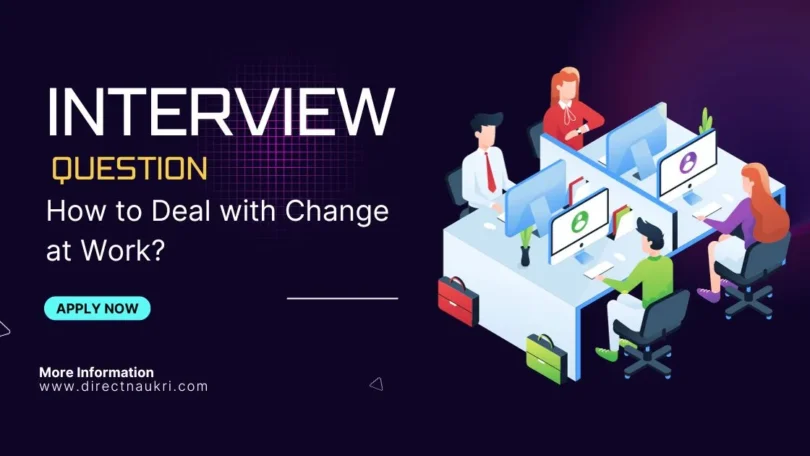Change – a word that can evoke excitement, fear, and a range of emotions. It has the power to transform our lives, both personally and professionally. When it comes to the workplace, change is inevitable, and navigating it with grace and resilience is key.
In job interviews, employers often ask candidates how they handle change at work. This question is designed to gauge your adaptability, problem-solving abilities, attitude towards embracing new challenges.
In this blog post, we will delve into effective strategies and tips on how to effectively answer the question: how to deal with change at work?
Embrace Change as an Opportunity for Growth and Learning
One of the most effective ways to deal with change at work is to embrace it as an opportunity for growth and learning.
Rather than viewing change as a negative force, frame it as a chance to expand your skill set, gain new experiences, and broaden your horizons.
Develop an Open Mindset
Having an open mindset is crucial when it comes to dealing with change. Embrace the idea that change is a natural part of professional development and that it can bring about positive outcomes.
Be receptive to new ideas, approaches, and perspectives that change may introduce.
Seek Continuous Learning Opportunities
During times of change, it’s important to seek opportunities for continuous learning. Take the initiative to attend workshops, training sessions, or conferences that can equip you with the necessary tools to navigate change effectively.
This shows potential employers that you are proactive and committed to personal and professional growth.
Stay Up-to-Date with Industry Trends
To navigate change successfully, staying up-to-date with industry trends is essential. Regularly read relevant publications, follow thought leaders in your field, and engage in discussions with colleagues and peers.
By doing so, you’ll be better equipped to adapt to changes in your industry and showcase your awareness during job interviews.
Develop Resilience and Flexibility
Resilience and flexibility are key qualities that employers value in their employees. These attributes demonstrate your ability to bounce back from setbacks and adapt to new circumstances.
Here’s how you can build resilience and flexibility in the face of change:
Embrace a Growth Mindset
A growth mindset is a belief that abilities and intelligence can be developed through dedication and hard work. By embracing a growth mindset, you foster resilience in the face of change.
Approach challenges with a positive attitude and see them as opportunities for growth, rather than obstacles.
Cultivate Emotional Intelligence
Emotional intelligence plays a significant role in dealing with change effectively. It involves understanding and managing your own emotions, as well as empathizing with others.
When faced with change, be aware of your emotions and practice self-regulation. Additionally, demonstrate empathy and support for colleagues who may be struggling with the transition.
Develop Adaptability Skills
Adaptability is the ability to adjust to new conditions and circumstances. To enhance your adaptability skills, expose yourself to new experiences and environments.
Seek out projects or tasks that push you out of your comfort zone and require you to adapt quickly. This will demonstrate to potential employers that you are agile and capable of thriving in dynamic work environments.
Latest Post: Things To Know Before Joining Your First Job as a Fresher
Effective Communication during Times of Change
Communication is paramount when navigating change at work. Employers want to see how candidates effectively communicate their thoughts, concerns, and ideas during periods of transition.
Here are some tips for effective communication during times of change:
Actively Listen
During meetings or conversations about change, practice active listening. This involves fully engaging in the conversation, focusing on the speaker, and demonstrating understanding through non-verbal cues.
Active listening shows your commitment to understanding others and creates a collaborative environment.
Ask Clarifying Questions
When faced with change, it’s crucial to ask clarifying questions to gain a clear understanding of expectations and objectives.
This demonstrates your willingness to seek guidance and ensures that you are aligned with the goals of the organization.
Provide Constructive Feedback
Change often requires adjustments and fine-tuning. In interviews, employers look for candidates who can provide constructive feedback and suggestions for improvement.
By offering well-thought-out feedback, you showcase your critical thinking skills and ability to contribute to the growth of the organization.
Demonstrating a Positive Attitude
A positive attitude is vital when it comes to dealing with change at work. It shows potential employers that you can adapt to new situations while maintaining productivity and morale.
Here’s how you can demonstrate a positive attitude:
Embrace Change with Enthusiasm
Express enthusiasm when discussing past experiences with change during interviews. Highlight situations where you proactively embraced change and how it resulted in positive outcomes.
This demonstrates your ability to thrive in dynamic environments and motivates others to view change as an opportunity.
Stay Solution-Oriented
During periods of change, approach challenges with a solution-oriented mindset. Instead of dwelling on problems, focus on finding creative solutions.
This showcases your critical thinking skills and ability to overcome obstacles in a productive and positive manner.
Practice Self-Care
Managing change can be emotionally and mentally draining. To maintain a positive attitude, practice self-care regularly.
Prioritize activities that help you relax, recharge, and manage stress. When employers see that you prioritize your well-being, it signals that you have the resilience to navigate change effectively.
Conclusion
Change at work is inevitable, and how we navigate it can greatly impact our professional success. When faced with the question “how to deal with change at work?” in an interview, it’s essential to highlight your adaptability, problem-solving abilities, and positive attitude.
By embracing change as an opportunity for growth, developing resilience and flexibility, practicing effective communication, and demonstrating a positive attitude, you can confidently respond to this question and stand out as a candidate who is prepared to thrive in the face of change.
Remember, change is not a setback, but a chance for personal and professional growth.
FAQs
How do I demonstrate adaptability in the face of workplace change?
Showcase your ability to embrace new processes or technologies. Highlight experiences where you successfully navigated change, emphasizing your flexibility and positive attitude.
Can you provide an example of effectively managing a work-related transition?
Share a specific scenario where you adapted to change, outlining the challenges, actions taken, and positive outcomes. Illustrate how you turned a potential obstacle into an opportunity.
What keywords should I include when discussing change in a job interview?
Keywords include adaptability, flexibility, resilience, positive attitude, problem-solving, and proactive approach. Incorporate these terms when describing your experience with workplace changes.
How can I express enthusiasm for change during an interview?
Emphasize your openness to growth and learning. Communicate your eagerness to embrace new challenges, highlighting how you see change as an opportunity for personal and professional development.
What if I haven’t experienced much change in my previous roles?
Even if your roles have been stable, draw on instances where you proactively sought learning opportunities or volunteered for projects outside your comfort zone. Showcase your eagerness to adapt.
How do I handle the question if I feel uncomfortable with change?
Acknowledge the discomfort positively. Share how you recognize the importance of adapting to evolving work environments and express your commitment to overcoming challenges through continuous learning.







